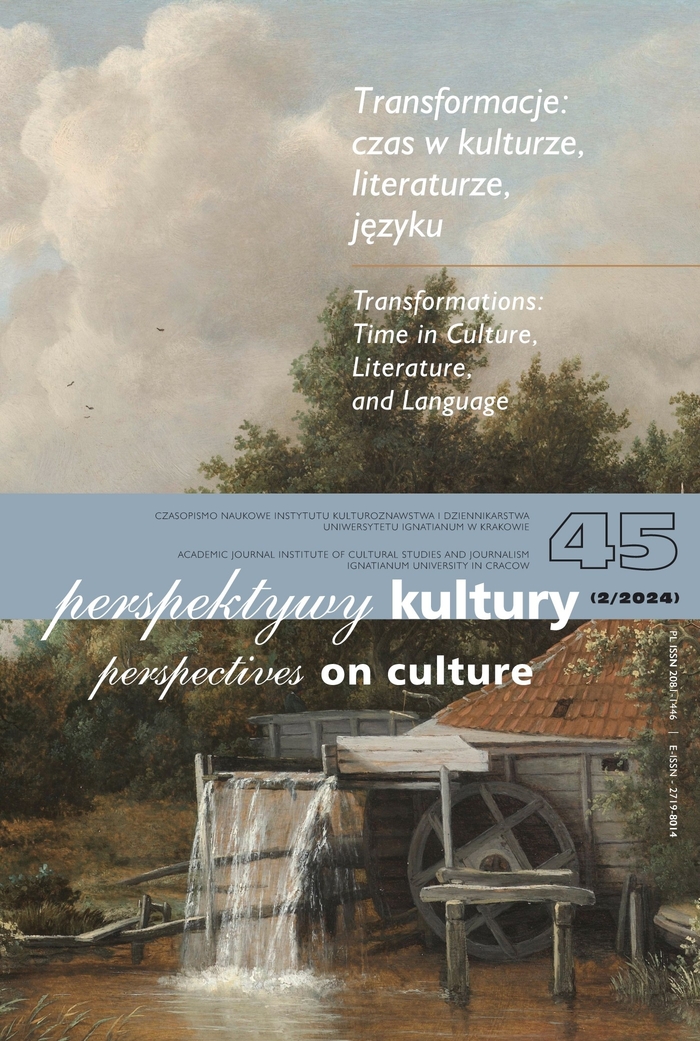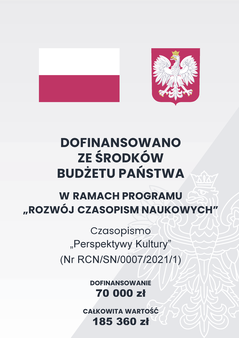Dobrostan psychiczny kobiet w Polsce podczas dwóch fal pandemii
Abstrakt
Celem przedstawionego w artykule badania było opisanie dobrostanu psychicznego kobiet w Polsce w czasie dwóch fal pandemii COVID-19. W prezentowanych badaniach poprzecznych wykorzystano wystandaryzowane narzędzia do oceny nastroju, emocji, optymizmu i satysfakcji z życia. Opracowano i wykorzystano także kwestionariusz do gromadzenia danych socjodemograficznych oraz danych dotyczących bieżących obaw. Badanie przeprowadzono dwukrotnie: na przełomie 2020/2021 (T1) i 2021/2022 (T2) w dwóch różnych, ale odpowiadających sobie pod względem zmiennych demograficznych grupach kobiet (T1: 352; T2: 372). Najsilniejsze stresory dla Polek w obu pomiarach wiązały się z trudnościami w dostępie do służby zdrowia, klimatem politycznym w Polsce oraz obawą o zdrowie bliskich. Nastrój w obu pomiarach był gorszy w porównaniu z danymi normatywnymi sprzed pandemii. Pogorszenie emocji było szczególnie wyraźne w przypadku uczuć negatywnych. Rozkład wyników w zakresie optymizmu i satysfakcji z życia był znacznie bardziej zrównoważony i zbliżony do norm sprzed pandemii. Nie stwierdzono znaczących różnic pomiędzy obydwoma pomiarami. Wyniki pokazują, że wzrostowi negatywnych emocji nie musi towarzyszyć pogorszenie takich cech jak optymizm i satysfakcja z życia. Wyniki wskazują zatem obszary, które powinny zostać objęte wsparciem, oraz obszary stanowiące zasoby, na których można się oprzeć.
Bibliografia
Adisa, T.A., Aiyenitaju O., Adekoya, O.D. (2021). The work–family balance of British working women during the COVID-19 pandemic. Journal of Work-Applied Management, 13(2), 241-260. https://doi.org/10.1108/JWAM-07-2020-0036.
Arrosa, M.L., Gandelman, N. (2016). Happiness Decomposition: Female Optimism. Journal of Happiness Studies, 17, 731–756. https://doi.org/10.1007/s10902-015-9618-8.
Biel, K., Twardowska-Staszek, E., Rostek, I. (2023). Optimism and Life Satisfaction of Poles during the Second and Fourth Waves of the COVID-19 pandemic. The Person and the Challenges, 13 (1), 243–269, https://doi.org/10.15633/pch.13115.
Bojanowska, A., Kaczmarek, Ł.D., Koscielniak, M., Urbańska, B. (2021). Changes in values and well-being amidst the COVID-19 pandemic in Poland. PLoS ONE, 16(9), e0255491. https://doi.org/10.1371/journal.pone.0255491.
Brzozowski, P. (2010). Skala Uczuć Pozytywnych i Negatywnych SUPIN: Polska Adaptacja Skali PANAS Davida Watsona i Lee Anny Clark. Warszawa: Pracownia Testów Psychologicznych Polskiego Towarzystwa Psychologicznego.
Carli, L. (2020). Women, Gender equality and COVID-19. Gender in Management, 35(7/8), 647-655. https://doi.org/10.1108/GM-07-2020-0236.
Connor, J., Madhavan, S., Mokashi, M., Amanuel, H., Johnson, N.R., Pace, L.E., Bartz, D. (2020). Health risks and outcomes that disproportionately affect women during the Covid-19 pandemic: A review. Social Science & Medicine, 266, 113364. https://doi.org/10.1016/j.socscimed.2020.113364.
Davies, S. (2020). Risk of Online Sex Trolling Rises as Coronavirus Prompts Home Working. Reuters, Retrieved from: https://www.reuters.com/article/uswomen-rights-cyber~ashing-trfn-idUSKBN2153HG (retrieved November 24, 2022).
Diener, E., Emmons, R.A. Larsen, R.J., Griffin, S. (1985). The Satisfaction with Life Scale. Journal of Personality Assessment, 49, 71–75. https://doi.org/10.1207/s15327752jpa4901_13.
Dragioti, E., Li, H., Tsitsas, G., et al. (2022). A large‐scale meta‐analytic atlas of mental health problems prevalence during the COVID‐19 early pandemic, Journal of Medical Virology, 94, 1935-1949. https://doi:10.1002/jmv.27549.
Dziennik Ustaw Rzeczypospolitej Polskiej (2021, January 27). Wyrok Trybunału Konstytucyjnego z dnia 22 października 2020 r. Retrieved from: https://isap.sejm.gov.pl/isap.nsf/download.xsp/WDU20210000175/O/D20210175.pdf (retrieved: November 24, 2022).
Goryńska, E. (2005). Przymiotnikowa Skala Nastroju UMACL Geralda Matthewsa, A. Grahama Chamberlaina, Dylana M. Jonesa. Warszawa: Pracownia Testów Psychologicznych Polskiego Towarzystwa Psychologicznego.
GUS (April 2022). Szybki szacunek wskaźnika cen towarów i usług konsumpcyjnych w kwietniu 2022 roku. Retrieved from https://stat.gov.pl/obszary-tematyczne/ceny-handel/wskazniki-cen/szybki-szacunek-wskaznika-cen-towarow-i-uslug-konsumpcyjnych-w-kwietniu-2022-roku,21,1.html. (retrieved May 20, 2022).
Helmich, D.W., Post, E. (2021, 27 May) Success of Women Leadership during COVID-19: At Risk of Essentialising “The Feminine”? Retrieved from https://www.uu.nl/en/news/success-of-women-leadership-during-covid-19-at-risk-of-essentialising-the-feminine (retrieved November 22, 2022).
Hessami, K., Romanelli, C., Chiurazzi, M., Cozzolino, M. (2020). COVID-19 pandemic and maternal mental health: a systematic review and meta-analysis. The Journal of Maternal-Fetal & Neonatal Medicine, 35(20), 4014-4021. https://doi.org/10.1080/14767058.2020.1843155.
Ipsos (April 2022). What worries the world. April 2022. Retrieved from https://www.ipsos.com/en-ch/what-worries-world-april2022 (retrieved May 20, 2022).
Juczyński, Z. (2012). Narzędzia Pomiaru w Promocji i Psychologii Zdrowia. Warszawa: Pracownia Testów Psychologicznych Polskiego Towarzystwa Psychologicznego.
Marszał-Wiśniewska, M., Nowicka, M. (2018). Individual Differences in Mood Changes. Journal of Happiness Studies, 19, 1415–1438. https://doi.org/10.1007/s10902-017-9879-5.
Matthews, G., Jones, D.M., Chamberlain, A.G. (1990). Refining the measurement of mood: The UWIST Mood Adjective Checklist. British Journal of Psychology, 81, 17–42. https://doi.org/10.1111/j.2044-8295.1990.tb02343.x.
Milovanska-Farrington, S. (2021). The Effect of COVID-19 as an Economic Shock on the Gender and Ethnic Gap in Labour Market Outcomes. Studies in Microeconomics, 9(2), 227–255. https://doi.org/10.1177/23210222211046411.
Purdie, A., Hawkes, S., Buse, K., Onarheim, K., Aftab, W., Low, N., Tanaka, S. (2020, March 24). Sex, gender and COVID-19: disaggregated data and health disparities, BMJ Global Health Blog. Retrieved from https://blogs.bmj.com/bmjgh/2020/03/24/sex-gender-and-covid-19-disaggregated-data-and-health-disparities/ (retrieved November 24, 2022).
Scheier, M.F., Carver, C.S., Bridges, M.W. (1994). Distinguishing optimism from neuroticism (and trait anxiety, self-mastery, and self-esteem): A reevaluation of the Life Orientation Test. Journal of Personality and Social Psychology, 67, 1063–1078. https://doi.org/10.1037/0022-3514.67.6.1063.
Schokkenbroek, J.M., Hardyns, W., Anrijs, S., Ponnet, K. (2021). Partners in Lockdown: Relationship Stress in Men and Women During the COVID-19 Pandemic. Couple and Family Psychology: Research and Practice, 10(3), 149–157. https://doi.org/10.1037/cfp0000172.
Seligman, M., Csikszentmihalyi, M. (2000). Positive psychology: An introduction. American Psychologist, 55(1), 5–14. https://doi.org/10.1037/0003-066X.55.1.5.
Smith, J. (2019). Overcoming the ‘tyranny of the urgent’: integrating gender into disease outbreak preparedness and response. Gender & Development, 27(2), 355–369. https://doi.org/ 10.1080/13552074.2019.1615288.
Suligowski, R., Ciupa, T. (2023). Five waves of the COVID-19 pandemic and green–blue spaces in urban and rural areas in Poland. Environmental Research, 216(3), 114662. https://doi.org/10.1016/j.envres.2022.114662.
Thibaut, F., van Wijngaarden-Cremers, P.J.M. (2020). Women’s Mental Health in the Time of Covid-19 Pandemic. Frontiers in Global Womens’ Health, 1, 588372. https://doi.org/10.3389/fgwh.2020.588372.
Twardowska-Staszek, E., Seredyńska, A., Rostek, I., Biel, K. (2021a). Nastrój i emocje Polaków podczas pandemii COVID-19. Horyzonty Wychowania, 20(55), 11-26. https://doi.org/10.35765/hw.2075
Twardowska-Staszek, E, Rostek. I, Biel K, Seredyńska A. (2021b). Predictors of Positive and Negative Emotions Experienced by Poles during the Second Wave of the COVID-19 Pandemic, “International Journal of Environmental Research and Public Health”, 18(22): 11993. https://doi.org/10.3390/ijerph182211993
UN Women (2020, March 27). Gender-Responsive Prevention and Management of the COVID-19 Pandemic: From Emergency Response to Recovery & Resilience, Retrieved from https://www.unwomen.org/sites/default/files/Headquarters/Attachments/Sections/News%20and%20events/In%20Focus/COVID-19/Gender-responsive-prevention-management-COVID19.pdf (retrieved November 24, 2022).
Watson, D., Clark, L.A., Tellegen, A. (1988). Development and validation of brief measures of positive and negative affect: the PANAS scales. Journal of Personality and Social Psychology, 54, 1063–1070. https://doi.org/10.1037/0022-3514.54.6.1063.
Xia, C.-L., Wei, A.-P., Huang, Y.-T. (2022). The COVID-19 Lockdown and Mental Wellbeing of Females in China. International Journal of Environmental Research and Public Health, 19, 4960. https://doi.org/10.3390/ijerph19094960.
Copyright (c) 2024 Perspektywy Kultury

Utwór dostępny jest na licencji Creative Commons Uznanie autorstwa 4.0 Międzynarodowe.
Autor, zgłaszając swój artykuł, wyraża zgodę na korzystanie przez Wydawnictwo Uniwersystet Ignatianum z utworu na następujących polach eksploatacji:
- utrwalania utworu w formie papierowej, a także na nośniku cyfrowym lub magnetycznym;
- zwielokrotnienia utworu dowolną techniką, bez ograniczenia ilości wydań i liczby egzemplarzy;
- rozpowszechniania utworu i jego zwielokrotnionych egzemplarzy na jakimkolwiek nośniku, w tym wprowadzenia do obrotu, sprzedaży, użyczenia, najmu;
- wprowadzenia utworu do pamięci komputera;
- rozpowszechniania utworu w sieciach informatycznych, w tym w sieci Internet;
- publicznego wykonania, wystawienia, wyświetlenia, odtworzenia oraz nadawania i reemitowania, a także publicznego udostępniania utworu w taki sposób, aby każdy mógł mieć do niego dostęp w miejscu i czasie przez siebie wybranym.
Wydawca zobowiązuje się szanować osobiste prawa autorskie do utworu.






